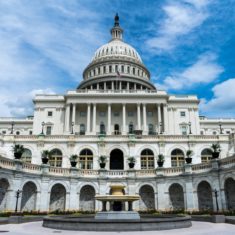Congress to Hear Testimony This Week on the Subject of Federal Legislation of Online Gaming
 Between the scheduled Congressional testimony of a potential Supreme Court justice accused of sexual assault and the Deputy Attorney General’s meeting with the U.S. President expected by many to fire him, Thursday is shaping up to be a big news day. Amidst all the drama on the Hill, there will also be a hearing taking place in front of the Subcommittee on Crime, Terrorism, Homeland Security, and Investigations on the topic of online gaming and the possible revival of the federal Wire Act.
Between the scheduled Congressional testimony of a potential Supreme Court justice accused of sexual assault and the Deputy Attorney General’s meeting with the U.S. President expected by many to fire him, Thursday is shaping up to be a big news day. Amidst all the drama on the Hill, there will also be a hearing taking place in front of the Subcommittee on Crime, Terrorism, Homeland Security, and Investigations on the topic of online gaming and the possible revival of the federal Wire Act.
In today’s hyperbolic political climate, one wonders whether the hearing will echo the last time this same subcommittee discussed the subject in 2015, an event later described as running “the Gamut from Informed to Insane.”
Expected to testify this week are Jocelyn Moore of the NFL, Sara Slane of the American Gaming Association, Jon Bruning of the Coalition to Stop Online Gaming, Becky Harris of the Nevada Gaming Control Board, and Professor John Kimdt of the University of Illinois. Professor Kimdt, by the way, has made it his life’s work to outlaw gambling of all types; he has a “dubious” reputation amongst academic researchers, and was held at least partly responsible for sending the 2015 hearing “off the rails.” The NFL of course was one of the original plaintiffs in the case challenging sports betting in New Jersey.
That case, Murphy v. NFL, represents the massive change in the gaming landscape since the previous congressional hearing on the subject of federal regulation. In Murphy, the Supreme Court ultimately ruled that states – not the federal government- have the right to decide whether to allow legalized sport betting within their borders. Many expect this interpretation to apply as well to other forms of betting, including online.
As Grover Norquist, president of Americans for Tax Reform, wrote in The Hill yesterday, the Supreme Court decision made clear “that all 50 states have to be treated the same, and that the federal government could not tell the states what to legalize or ban. While gambling can be a contentious issue, this makes it even more appropriate for states to decide, rather than a ‘one size fits all’ federal approach.”
Trying to revive the federal Wire Act, legislation originally intended to target organized crime during the Kennedy administration, ignores the current judicial, regulatory and economic climate. Mobile entertainment offered within a strict regulatory framework on the state level has been shown to protect consumers while allowing them to play games and place bets from anywhere. Online safeguards allow for real-time tracking and age monitoring tools, and stringent auditing and constant monitoring track and prevent online fraudulent activity.
New Jersey is a prime example of rational regulation of online gaming that has effectively implemented these processes. Research there shows that online gaming provides significant economic benefits through increased tax revenue and jobs. With all states now able to decide whether to allow legalized sports betting within their borders, the general online gaming market is poised for significant large-scale growth.
New Jersey’s legislation actually considered the Wire Act’s prohibition against interstate transmissions of money for gaming purposes and specifically included provisions in its state law to exempt intermediate routing across states from creating federal jurisdiction. This may be the wave of the future for state sports betting bills.
Stay tuned for news on whether the hearing on Thursday addresses the millions of dollars currently being collected every month by states enjoying the benefits of online gaming and wagering, and the benefits flowing to their communities from the increased jobs and tax revenue. Reviving outdated federal laws will only create an impediment to this growing industry.
